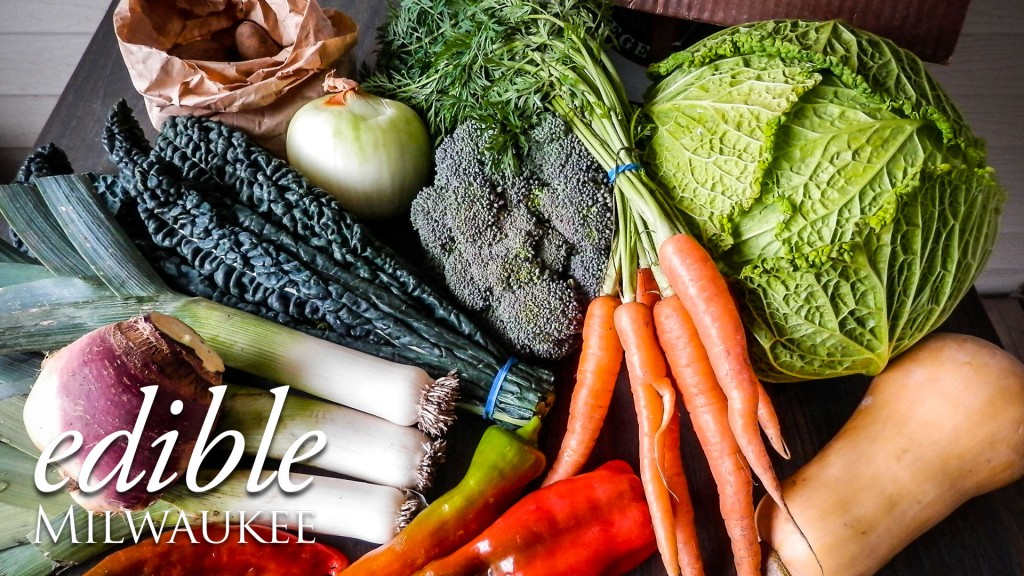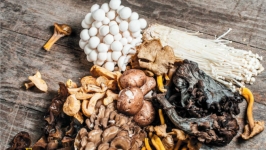Springing for C.S.A.s
Support Your Community Agriculture
Even the biggest veggie lover must admit, nothing about kohlrabi seems particularly edible. The knobbly bulb with thick, waxy skin looks like something that should stay in the ground, not something that should sit snuggling in a shopping cart with bunches of carrots and kale. With no one there to explain that once washed and peeled, kohlrabi has endless culinary applications—from fritters and fries to coleslaw and cream soups—it’s no wonder why most people pass it up.
But if you have shaken the hand of the farmer who plucked that kohlrabi from the ground, who placed it in a box and delivered it to your neighborhood, odds are you will be inclined to give it a try. This is community-supported agriculture, a partnership between a farm and a local group of supporters who receive a box of justpicked produce each week of the growing season. Boxes vary from farm to farm, but a member could expect to see bunches of radishes in June, bulbs of fennel in July, eggplant in August, tomatoes in September, rutabagas in October and bok choy in November.
With each box of bounty comes a newsletter, giving updates from the farm and recipes highlighting the produce. David Kozlowski and Sandy Raduenz, co-owners and operators of Pinehold Gardens in Oak Creek, are always mindful of what meals could be made from the box’s contents. Like all C.S.A.s, Pinehold Gardens’ newsletter includes box-specific recipes, which are submitted by local chefs or C.S.A. members.
Carly Huibregtse, a student at Milwaukee Institute of Art & Design and Riverwest resident, was skeptical when a few unfamiliar items landed in her C.S.A. box last summer. “I didn’t know what to do with a lot of the veggies at first,” says Huibregtse. She split the C.S.A. membership, from Rare Earth Farm in Belgium, with a friend.
Having so much fresh produce on hand forced Huibregtse to up her vegetable IQ and get creative in the kitchen. When softball-sized celeriac and foot-long leeks were in their C.S.A. box, Huibregtse found a recipe for soup in the Rare Earth Farm newsletter. She also tried her hand at pickles and preserves. “The C.S.A. definitely made me curious about where my food comes from,” says Huibregtse. “It also taught me to try new things.”
For Huibregtse, the weekly box was also an opportunity to bring friends together around the dinner table. “The C.S.A. was always a fun excuse to cook a meal for a few people,” says Huibregtse. Beth Kazmar, co-owner and operator of Tipi Produce in Evansville with Steve Pincus, says many people don’t realize the difference of freshpicked versus store-bought food. “You can taste the difference,” Kazmar says. Most supermarket produce has been picked underripe to survive shipping and increase shelf life. Whereas, C.S.A. members often receive produce that has been harvested within 24 hours.
C.S.A.s promote a sense of community as much as they do local, seasonal eating. “It’s nice to remember that C.S.A. is not just about the food, hopefully, but also about the group of people who are supporting the farm together,” says Debra Jo Becker, co-owner of Rare Earth Farm with her husband, Steve Young. Like most C.S.A. programs, Becker and Young encourage members to volunteer at Rare Earth, but they also offer activities that coax people out to the farm. Weekend yoga, a fall harvest festival, pumpkin carving and farm dinners are just a few ways they facilitate a sense of community.
Jeff Schreiber, co-owner with Kelly Kiefer of Three Sisters Community Farm in Campbellsport, says it can be a challenge to get C.S.A. members to take the time to visit the fields. “The best part of running a C.S.A. is connecting with the people who make the effort to connect with the farm,” says Schreiber. But members seem to have increasingly busy schedules, making it more difficult for them to come to Three Sisters.
Any C.S.A. farmer would agree, having members spend an afternoon or even an hour on the farm is always a fruitful experience. It’s when people walk the fields, pet the animals and talk to the farmers, that they fully appreciate what comes in their box each week. For Becker and other farmers, children are the most rewarding to watch explore the farm. “It’s incredible to see the light bulb go on that food doesn’t just appear in the grocery store,” says Becker. “They can make a full circle connection—from farm to fork.”
This is the aim of the C.S.A. model—to encourage local eating, to educate people about fresh produce, to create a sense of community and to inspire C.S.A. members to try new things. Most importantly, to farmers and members, C.S.A.s encourage the next generation of eaters to support local farms. “We have mothers who tell us their kids say the carrots they get from the store don’t taste like the ones from Farmer Dave,” says Kozlowski. “That kind of comment makes it all worth it.”
Choosing a C.S.A.
Choosing a C.S.A. that’s right for you can be a challenge. Factors include cost, convenience and the kind of produce offered. Urban Ecology Center hopes to ease the process by hosting the 14th Annual Local Farmer Open House on Saturday, March 12 from 11 a.m.-3 p.m. The event is held at UEC’s Riverside Campus, and provides an opportunity to meet local farmers and explore C.S.A. options.
If you can’t make it to the UEC event, here’s information from eight area C.S.A.s that may be helpful in your search. Visit our CSA page for a fuller list.
Harvest Farm, LLC
7112 County Rd. South, Hartford
262-673-6760
20-week season from June to November
Pick-up locations, farm pick up
Full share cost: $450
HighCross Farm
2292 Rustic Dr., Campbellsport
920-533-3276
20-week season from June to October
Pick-up locations; farm pick up
Large share cost: $690, small share cost: $520
Pinehold Gardens
1807 E. Elm Rd., Oak Creek
414-762-1301
18-week season from early July to November
Pick-up locations, farm pick up
Full share cost: $500
Rare Earth Farm
6806 Hwy KW, Belgium
262-285-7070
21-week season from mid-June to end of November
Pick-up locations and farm pick up
Full share cost: $615 (just vegetables); $105 (weekly egg share)
Three Sisters Community Farm
W3158 Hwy 67, Cambellsport
920-533-3042
20-week season from June to mid-October
Pick-up locations, home delivery and farm pick up
Full share cost: $635 (drop-off location); varies for home delivery
Tipi Produce
14706 W. Ahara Rd., Evansville
608-882-6196
24-week season from mid-May to end of October
Pick-up locations and farm pick up
Full share cost: $675
Turtle Creek Gardens
N5105 Pinnow Rd., Delavan
262-441-0520
18-week season runs from June to October
Pick-up locations and farm pick up
Full share cost: $600
Wellspring, Inc.
4382 Hickory Rd., West Bend
262-675-6755
20-week season runs from June 4 to October 15
Pick-up locations and farm pick up
Full share cost: $562






